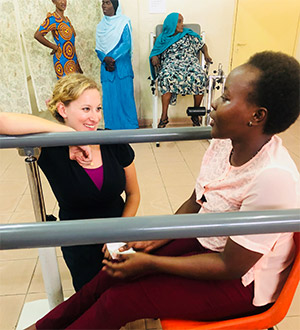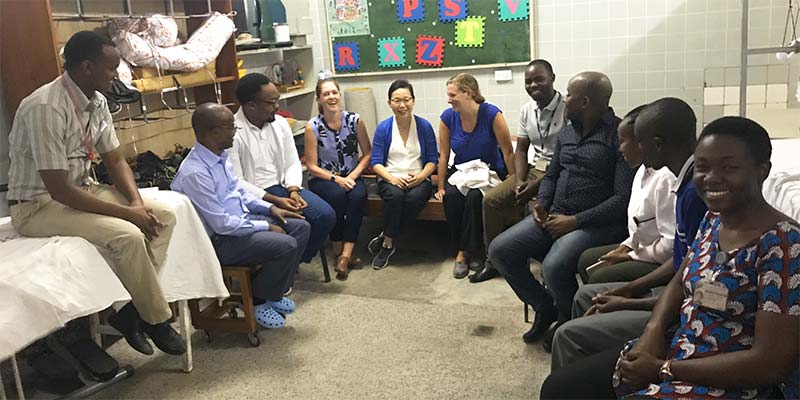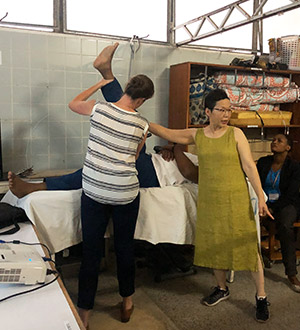In 2019 when Kaile Eison, DO, was a resident in the Department of Rehabilitation and Regenerative Medicine at NewYork-Presbyterian/

Dr. Kaile Eison consults with a patient during her elective in Tanzania.
“I had a great experience in Tanzania, and in joining the Columbia faculty I asked if I could direct global health for the department and expand the elective into a full longitudinal curriculum and track for the residency program,” says Dr. Eison, who today is Director of Global Health, Director of HIV Rehabilitation, and Associate Director of the Inpatient Rehabilitation Unit at NewYork-Presbyterian/
While global health educational experiences are becoming increasingly common in graduate medical education and are readily available in other specialties, there are relatively few structured global health experiences in Physical Medicine and Rehabilitation residency programs. “We wanted to provide residents with training and experience in global and public health. This opportunity, which would enable them to create projects based in sustainability, would be beneficial not only for the trainees, but also for the communities that we are working with in other countries,” says Dr. Eison.

Dr. Heakyung Kim, former Director of Pediatric Physical Medicine and Rehabilitation, NewYork-Presbyterian/
The new curriculum is integrated with NewYork-Presbyterian medical training programs established in Tanzania some two decades ago. Residents and fellows in multiple specialties train and provide care side-by-side with physicians and healthcare workers at the Bugando Medical Centre, where Weill Cornell Medicine established a medical school – Weill Bugando – in 2003.
“If we can start to create a global community for rehabilitation and help more people develop a skill set to address the functional needs of patients around the world, that would be very significant.” — Dr. Kaile Eison
Through the new global health curriculum in physical medicine and rehabilitation, residents and fellows are exposed to the practice of medicine in a low resource setting. Their experience is broad-based, including stroke care, treatment for spinal cord injuries, and management of musculoskeletal conditions.

Dr. Kim attends to a patient.
The Columbia global health track is now in its second year and includes 18 months of eight blocks starting in the third year of residency and going into the fourth year or the fellowship year. The curriculum emphasizes site-specific physiatry skills and cultural training. Residents focus on reducing health disparities, global health ethics, advocacy, and effecting change in health and social policy. “Each block is focused on a different area of global health or public health looking at these issues through the lens of rehabilitation,” says Dr. Eison.
The curriculum includes:
- Introduction to Global Health and the State of the World: Avoiding Medical Tourism, Decolonizing Global Health, Global Burden of Disability
- Global Health Ethics
- Comparative Health Systems
- Women’s Health and Gender Health Disparities
- Palliative Care in the Global South
- Perceptions of Disability
- Pertinent Pathologies and Project Specific Training
- Site Specific Cultural Education
Dr. Eison hopes to instill in the Columbia residents and fellows that their goal is not necessarily to bring their approach to medicine to another country, but to work within the construct of that country’s resources and belief systems. “We’re trying to open up the lines of communication and share knowledge to find out how people are addressing the same concerns that we may have here, but within the context of the societal and systemic issues they may have,” she says.
A Broader Commitment to Global Health
In addition to establishing the global health curriculum, Dr. Eison is also in the process of developing one of the first inpatient rehabilitation units in the region in collaboration with an occupational therapist at NewYork-Presbyterian/
Dr. Eison is also working with four physiatrists in the United States to develop an ACGME accredited national global health curriculum specific to physical medicine and rehabilitation that can be accessed virtually by residents who may or may not have a global health travel experience already existing within their residency program. “There are many people who are working in global health. One of our goals in developing a national curriculum is to try and bring these people together, not just nationally, but also globally, so that we can have these conversations on a broader scale.”


